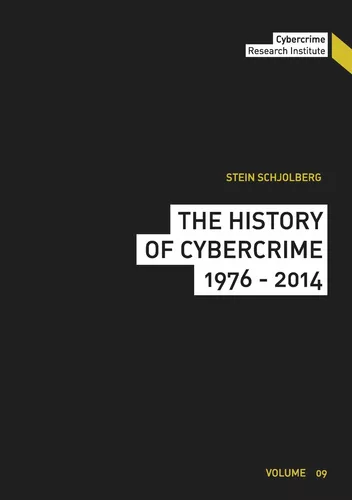Skip to the end of the images gallery Navigation umschalten
Skip to the beginning of the images gallery Navigation umschalten

The History of Cybercrime
1976-2014
Geistes-, Sozial- & Kulturwissenschaften
Paperback
224 Seiten
ISBN-13: 9783734732942
Verlag: Books on Demand
Erscheinungsdatum: 24.11.2014
Sprache: Englisch
Farbe: Nein
erhältlich als:
59,90 €
inkl. MwSt. / portofrei
Ihr eigenes Buch!
Werden Sie Autor*in mit BoD und erfüllen Sie sich den Traum vom eigenen Buch und E-Book.
Mehr erfahrenThis book presents the history of computer crime and cybercrime from the very beginning with punch cards, to the current data in the clouds and the Internet of Things (IoT).
Today the technological development of social media, such as Google, Facebook, YouTube, Twitter, and more, have been so rapid and the impact on society so fast and enormous, that codes of ethics, and public sentiments of justice implemented in criminal legislations, have not kept pace.
Conducts in social media need a better protection by criminal laws. But with the reluctance in developing similar responses in international laws or guidelines, we must ask ourselves if we once again may be in a similar situation as the US Senator Ribicoff focused on in 1977 when he launched the first Computer Crime Bill.
Cyber attacks against critical information infrastructures of sovereign States, must necessitate a response for global solutions. Most of the judges and lawyers around the world from a professional judicial point of view, would agree with the former US prosecutor Benjamin B. Ferencz in his statement:
“There can be no peace without justice, no justice without law and no meaningful law without a Court to decide what is just and lawful under any given circumstances.”
The judiciary is one of the three powers of any democratic state. Its mission is to guarantee the very existence of the Rule of Law and thus, to ensure the proper application of the law in an impartial, just, fair, and efficient manner. This basic principle must also be valid for Cyberspace at the international level.
The book presents a draft United Nations treaty on “A Third Pillar for Cyberspace – An International Court or Tribunal for Cyberspace.” Another draft United Nations Treaty is presented on combating online child sexual abuse.
The United Nations Declarations and principles for the protection of individual and human rights are fundamental rights also in Cyberspace. The same rights that people have offline must also be protected online.
Today the technological development of social media, such as Google, Facebook, YouTube, Twitter, and more, have been so rapid and the impact on society so fast and enormous, that codes of ethics, and public sentiments of justice implemented in criminal legislations, have not kept pace.
Conducts in social media need a better protection by criminal laws. But with the reluctance in developing similar responses in international laws or guidelines, we must ask ourselves if we once again may be in a similar situation as the US Senator Ribicoff focused on in 1977 when he launched the first Computer Crime Bill.
Cyber attacks against critical information infrastructures of sovereign States, must necessitate a response for global solutions. Most of the judges and lawyers around the world from a professional judicial point of view, would agree with the former US prosecutor Benjamin B. Ferencz in his statement:
“There can be no peace without justice, no justice without law and no meaningful law without a Court to decide what is just and lawful under any given circumstances.”
The judiciary is one of the three powers of any democratic state. Its mission is to guarantee the very existence of the Rule of Law and thus, to ensure the proper application of the law in an impartial, just, fair, and efficient manner. This basic principle must also be valid for Cyberspace at the international level.
The book presents a draft United Nations treaty on “A Third Pillar for Cyberspace – An International Court or Tribunal for Cyberspace.” Another draft United Nations Treaty is presented on combating online child sexual abuse.
The United Nations Declarations and principles for the protection of individual and human rights are fundamental rights also in Cyberspace. The same rights that people have offline must also be protected online.
Eigene Bewertung schreiben










Es sind momentan noch keine Pressestimmen vorhanden.